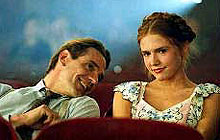|
|
|
|
Lolita
|
 |
|
I sincerely pity those members of the raincoat brigade who will be furtively stealing into this version of Vladimir Nabokov's Lolita expecting a grubby, exploitative rendering of its basic story line – the hopeless passion of the ageing literature professor Humbert Humbert (Jeremy Irons) for the gum-chewing, tune-humming, casually sexy teenage nymphet Lolita (Dominique Swain). Let's get this sex business out of the way immediately. The only clearly visible nudity in the film belongs neither to Humbert nor Lolita, but the third character in the film's fatal triangle – the mysterious and decadent Quilty (Frank Langella). The only sex scene in the film frames just the faces of Humbert and Lolita – and the subject of the scene is not their erotic pleasure but the volatility of their psychological and emotional bond. Those who reduce any manifestation of Lolita – the novel, Stanley Kubrick's superb 1962 screen adaptation, or now Adrian Lyne's version – to a crude, banal tale of paedophilia are helping to invent a new, right-wing form of political correctness. How can anyone be so wilfully blind and insensitive to what Nabokov's story is fundamentally about? Lolita is not a tale of rape, coercion, violence or the exploitation of a minor. It is – however disconcertingly – the portrayal of a relationship between two consenting individuals, each of whom have their own manipulative charms and powers. Humbert is not (as is made perfectly clear) Lolita's first lover; and, in fact, as their strange affair proceeds, it is she who (as in the above-mentioned sex scene) calls most of the shots. Furthermore, Lolita is centrally concerned with the pathetic nature of Humbert's longings. Irons' rendering of this complex character recalls his roles for David Cronenberg in Dead Ringers (1988) and M. Butterfly (1993). In all these cases, he plays a man who is the victim of his own capacity for fantasy projection, the dupe of his own desires. The sadness and tragedy of Nabokov's tale arise from the fact that Humbert never sees the plain reality of Lolita as another person – even when this truth is inescapably under his eyes. Oddly, in the entire, absurd circus that arose around the release of this Lolita, no one mentioned the slightly dubious pedigree of its director. Surely a filmmaker who has in his CV Foxes (1980), Nine and a Half Weeks (1986), Fatal Attraction (1987) and Indecent Proposal (1993) deserves a few cheap, abusive shots? As Richard Corliss has tartly noted, "Lyne and Lolita seemed a match made in New Hollywood heaven." Lyne's cinema has frequently been characterised by glossy erotica and a fashionable desire to titillate and shock. Even when posing as a more serious, topical dramatist (as in Fatal Attraction), his natural tendency is towards humour and histrionics, if not full-out hysteria. Any such doubts that a cinephile may bring to Lyne's Lolita are massaged by its early scenes, which give Humbert's burgeoning obsession with his nymphet a tacky, slow-motion sheen reminiscent of David Hamilton. Quickly, however, Lyne and screenwriter Stephen Schiff (who also collaborated on Clint Eastwood's True Crime [1999]) establish a reflective, sombre tone, emphasising Humbert's peculiar embodiment of male pathos. In fact, the chief problem with this Lolita as a film is its over-emphatic, maudlin interpretation of the material. Far too much screen time is taken up with sad close-ups of Irons, overlaid with heavy music by Ennio Morricone that sounds like tired out-takes from his score for Once Upon a Time In America (1984). Such a hard pedal on the tragic and mournful aspects of the story should have been a balm to all those more conservative, sensitive viewers who, apparently, desperately need moral reassurance from their moviegoing experiences. Those more open to the everyday complexities of art and life, however, may well feel that Lyne has been too cautious in his handling of this fascinating, explosive material. This Lolita is neither daringly explicit (like Kids, 1995) nor playfully perverse (like Crash, 1996). Kubrick's version, while it is a freer adaptation, better captures Nabokov's delicious black ironies, and approaches the novelist's ability to explore both the attractions and consequences of breaking moral taboos. One need only compare the respective uses of pop Muzak, or the depictions of Lolita's blowsy mother Charlotte – here dismally incarnated by Melanie Griffith – to instantly gauge the superiority of Kubrick's sensibility over Lyne's. What quality this new version displays is attributable almost wholly to the efforts of its principal cast. Irons and Swain bring truth and texture to their roles, while Langella (making full use of his rich, resonant voice) succeeds in bringing a new spin to a character indelibly associated with Peter Sellers. Lolita, like Great Expectations or Madame Bovary, has by now become an archetypal tale in our culture, almost floating free of its original author. There remain aspects of the story – like the hilarious clash between Humbert's European-style culture and Lolita's all-American, pop manners – which have yet to receive their due treatment on screen. Lyne's version is on many levels merely perfunctory. He is attune to the pathos of Humbert's fumbling, blinkered yearnings, but not to their dark comedy. For such dry laughs, however, we merely need to shift our attention from the screen to the so-called controversy that briefly threatened to snuff out this film's frail, public life. MORE Lyne: Unfaithful © Adrian Martin April 1999 |
![]()